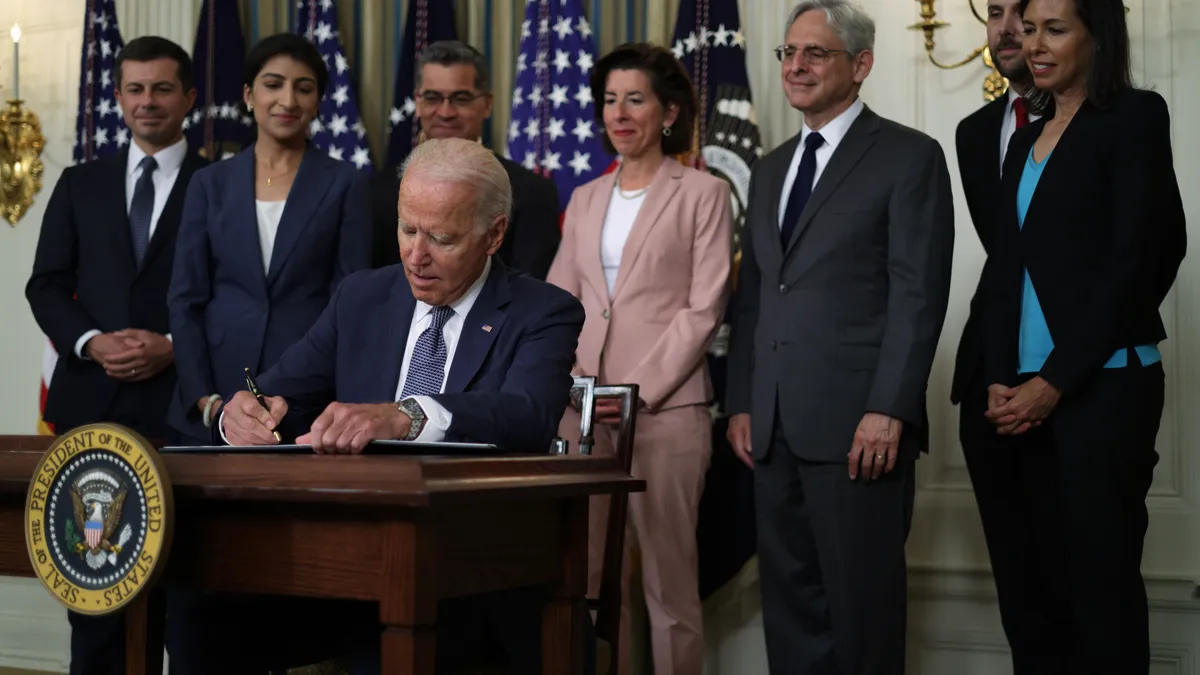The Biden Administration’s stepped-up antitrust focus will come to a head in 2024 to the extent its proposed merger guidelines, revised Hart-Scott-Rodino process and ban on noncompete agreements are finalized, making the coming months tricky for companies, Colin Kass of Proskauer Rose told Legal Dive.
“All of the balls are in motion,” said Kass, a partner at the firm and head of its antitrust practice.
The ban on noncompetes is probably the most consequential change that could be finalized next year but it’s likely to be challenged, giving companies breathing room if the ban is stayed while a court weighs its legality. “We’re not recommending clients make changes today,” he said.
The proposed changes to the HSR process, which would require companies to provide detailed information upfront even if most deals ultimately are cleared on antitrust grounds without further review, is also consequential. Once finalized, the changes will require companies to spend much more time and money upfront to comply with a process that in the past wasn’t that onerous for most deals.
“A lot of the time you could just sit back and wait to see if you’re going to get a call from an agency,” he said. “But that may no longer be a good strategy.”
Under the proposal, companies would have to submit a detailed narrative of why they want to do the deal, disclose projected revenue streams and provide data on previous acquisitions and labor market impacts and also include a transactional analysis on market conditions, among other things.
“You have to get antitrust counsel involved in transactions that you might not otherwise,” he said.
Much of the administration’s changing view of antitrust law is captured in its proposed merger guidelines, which Kass characterized as a return to an old school, 1960s-era enforcement approach because of its focus on concentration trends rather than just the individual transaction at issue.
“You must be more concerned about industry-level activity that wouldn’t have been antitrust sensitive in the past,” he said.
That means mergers that might not themselves impede competition could be seen as furthering a trend toward industry consolidation and challenged on those grounds.
“Agencies [will] examine whether further consolidation may substantially lessen competition or tend to create a monopoly,” the guidelines say.
If the guidelines are finalized in their proposed form, they could usher in a period of instability to the extent a new administration replaces them with its own wholesale revisions on taking office. That would represent a sea change, because up until this point, the guidelines have generally been considered nonpartisan and only updated periodically rather than revised with each administration.
“If these get adopted [as-is], almost certainly they won’t survive the next administration,” he said.
That could have implications for both private and government antitrust challenges that are litigated, because courts have traditionally looked to the guidelines to inform their rulings; if they become seen as partisan documents, that could change the role they’ve played over the years.
“Whether the courts will continue to view them as [non-partisan antitrust principles], we don’t know,” he said.











